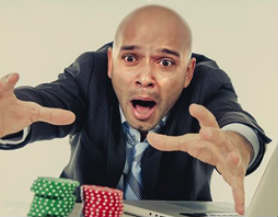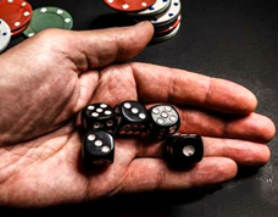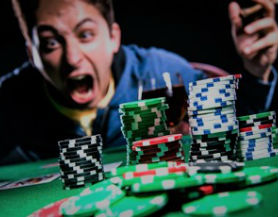Gambling Addiction as Mental Disorder
While alcohol and drug addictions are widely known and considered serious problems, gambling addiction is still underestimated. Generally, it’s similar to other addictions as it’s associated with strong mental illness and may be either a cause or a consequence of other disorders.
Often, people hope that shiny slots or luxury roulettes can help them deal with depression or anxiety, but it always turns upside down and gambling makes these problems worse.

Dr. John Grant from the University of Chicago has studied several groups of gamblers, and he reveals that 76% of players suffer from depression and 16-40% feel anxiety.
At the same time, 24% of the surveyed individuals have a progressive bipolar disorder, while 12% of them have symptoms of the attention-deficit/hyperactivity disorder. Mr. Grant insists on the treatment of gambling addicts should include diagnosing and curing these problems, too.
If you think that this type of addiction is rare, let’s look at the stats (2014-2016 studies):
- Losses per country, 2014: the USA ($116 billion) and China ($62 billion)
- Losses per adult, 2014/2016: Australia ($916/$1,000) and Singapore ($891/$650)
- Places by revenues per capita, 2016: Macau ($1,354) and Australia ($736)
- Gamblers by age: 16-24 (1.4% of all people) and 35-44 (1.1%)
- Gamblers by gender: men (1.2%) and women (0.1%)
As the UK is one of the gambling leaders, you might be interested in its stats. 56% of the British people gambled in 2016 and 1.2% of all these gamblers were considered pathological ones. Moreover, 6.6% of gamblers were at risk of addiction.
What is Gambling Addiction?
Now, let’s figure out the main definition of gambling addiction or (as it’s also called) problem gambling. Basically, it refers to a strong desire for gambling,which a person can’t control. Similarly to other addictions, this one can lead to significant harmful consequences and inability to stop, even when a gambler realizes the problem.
The American Psychiatric Association considers problem gambling a disorder, but not an addiction. Though, the expert research shows that this problem triggers the brain’s reward mechanisms (like other addictions), rather than the brain’s fear mechanisms (like other obsessive-compulsive disorders).
Causes of the Addiction
Basically, there is no one and only reason for gambling addiction. Instead, it is caused by biological factors, social triggers, and the person’s thinking. Also, some points are critical when it comes to addictions:

- Mood problems
- Low serotonin rates
- Alcohol or drug addiction
- Antisocial disorders
- Schizophrenia
- Bipolar disorder
Some reports say that patients who take the medicine to fight Parkinson’s disease or restless leg syndrome are more vulnerable to gambling addiction. The reason may be at a higher level of dopamine.
Still, if you don’t have significant health problems, pay attention to mood changes, stress, and money problems as these can force you into problem gambling. A sudden huge win may also lead to pathological gambling because you will strive for higher jackpots. Finally, the casino-friendly regions like Vegas or Macau are the places to avoid for addicts; but with the rise of online casinos, the whole world has become the risk area.
Symptoms of the Disorder
While there are different definitions of gambling addiction, the APA lists a set of symptoms characteristic of this mental illness. To diagnose the problem, at least four of them should be detected within a year:
- The strong and uncontrolled urge to gamble

- The irritation when trying to stop playing
- Repeated and failed attempts to stop playing
- Compulsive ideas about past, current or future plans
- Gambling in a distressed state
- The desire to recoup after losses
- Concealing gambling excitement from the close ones
- Problems with family, work or education
- High debt burdens
Medical screening aimed at detecting gambling addiction is harm-based. Different institutions have developed their own measures on the basis of APA’s list. Let’s say, you can undergo the NODS, the CPGI, and the VGS tests.
Gambling Addiction Consequences
So far as this addiction is often underestimated, people think that consequences are slight – insignificant money losses, a bit of anxiety, and fatigue. In reality, gambling addiction is way more harmful. Here are some of the most evident problems:
- Financial issues. Small or high debts, bankruptcy, poverty.
- Legal issues. Theft, disorderly conduct, prostitution, imprisonment.
- Social issues. Poor performance, job loss, domestic violence, quarrels.
- Health issues. Stress, insomnia, stomach pain, headache, mental disorders.
Addiction Risks to Be Aware Of
Like any other addiction, problem gambling is a tricky malady, and various factors can sow the seeds of its growth.
- Age. The youth and mid-life people are predisposed to fall into such type of addiction. Also, children or teenagers can become addicts if they were involved in or allowed to gamble. However, problem gambling may affect elderly people as well.
- Gender. Gambling addiction is more about males than females. However, older females who play casino games regularly can also make a habit of it, and very soon. Still, the cases of gambling compulsion among both genders are getting dramatically widespread.
- Behavioral ailments. People, who suffer from other addictions, mental disorders, unhappiness or distress are more likely to start gambling. Moreover, bipolar affective disorders, repetitive behaviors or attention-deficit/hyperactivity disorders (ADHD) may be a precondition to gambling addiction.
- Family/friends influence. In case your family members or friends are addicted to gambling, there is a high probability that you will also get into it.
- Specific medicines. Some medicines (mainly, dopamine agonists) might have an infrequent after-effect that can lead to unconscious acts. As a result, people taking these medicines can also become addicted to gambling.
- Character traits. Workaholics, as well as ambitious, reckless, anxious or quickly fatigued people are at risk of gambling compulsion.
Psychotherapy Treatment in Gambling Addiction
Nowadays, there are lots of treatment methods used to deal with pathologic gamblers. But unfortunately, no certified practice guidelines exist. In the medical context, gambling addicts are provided with a wide range of rehabilitation opportunities, pharmacological treatment, individual psychotherapy, and even group/family therapy.
Among those mentioned, psychotherapy is the most frequently used method. Also, some varieties of it may be applied to treat betting addicts:
- group support – for example, Gamblers Anonymous (GA);
- cognitive behavioral therapy is aimed at recognizing negative-thinking patterns, cognitive malformations, and confused ideas about gambling which trigger obsessive playing;
- behavioral therapy is based on the fundamentals of traditional operant conditioning approach;
- psychoanalysis resolves social struggles in treatment;
- psychodynamic therapy focuses on distinguishing the purpose behind continuous playing and solving conflicts that might have influenced it;
- family therapy is held to define problematic family dynamics and attempts to solve any disputes and disagreements;
- harm reduction techniques involve establishing time limitations for gambling, or playing with money, and making a profit/loss plan.
Conclusion
Gambling addiction may even trigger suicidal thoughts and suicide attempts, so it’s a serious illness, which is dangerous for gamblers. Remember about risks and never lose control over the gambling process, so you can enjoy this experience without issues. Play safe!